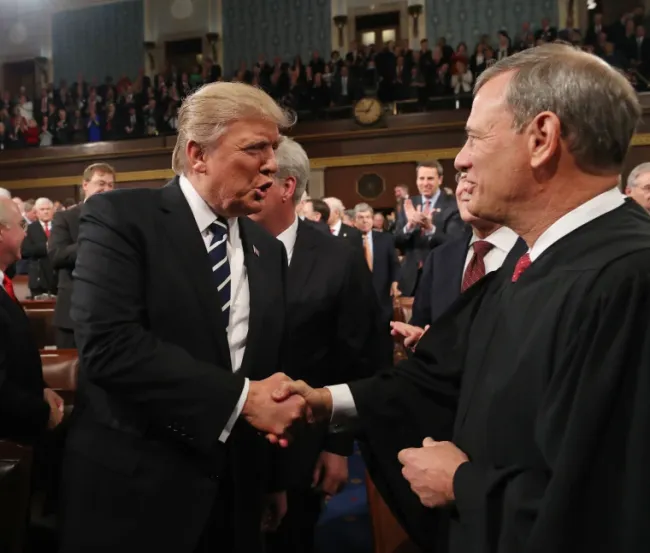Roberts and Barrett Join Liberals in Landmark Ruling, Exposing a Deeply Divided Bench: Supreme Court Rebukes Trump
In a dramatic decision, the U.S. Supreme Court has blocked President-elect Donald Trump’s last-ditch attempt to delay his criminal sentencing in the New York hush-money case.
Delivered on January 9, 2025, the 5-4 ruling clears the way for an unprecedented moment in U.S. history: a convicted felon assuming the presidency. Chief Justice John Roberts and Justice Amy Coney Barrett joined the court’s liberal justices—Sonia Sotomayor, Elena Kagan, and Ketanji Brown Jackson—in denying Trump’s request for a stay, laying bare the ideological fractures within the nation’s highest court. Conservative Justices Clarence Thomas, Samuel Alito, Neil Gorsuch, and Brett Kavanaugh dissented, further underscoring the court's political tensions.
The Case and Trump’s Legal Gambit
Trump’s conviction in May 2024 stemmed from 34 felony counts of falsifying business records tied to a $130,000 hush-money payment to adult film actress Stormy Daniels during the 2016 presidential campaign. Facilitated by his former lawyer Michael Cohen, the payment was intended to silence Daniels about an alleged affair—a claim Trump has repeatedly denied.
Desperate to avoid sentencing, Trump filed an emergency appeal with the Supreme Court, arguing that the proceeding would disrupt his presidential transition and infringe on his immunity as president-elect. His legal team also criticized the trial’s use of social media posts and testimony from White House aides, claiming they conflicted with a July 2024 Supreme Court decision on presidential immunity.
The court’s majority was unmoved. In their decision, they emphasized that Trump’s concerns could be addressed through the normal appeals process and dismissed his argument that a virtual sentencing hearing posed any real burden. Judge Juan Merchan, who oversaw the trial, has already indicated that Trump’s sentencing will not include jail time, fines, or probation. Still, the conviction represents a significant stain on Trump’s legacy as he prepares to return to the Oval Office.
A Fractured Supreme Court
The ruling highlights a rare act of judicial independence from Chief Justice Roberts and Justice Barrett, whose decision to join the liberal justices reflects an acknowledgment of the rule of law over political allegiance. In contrast, the four conservative dissenters—Thomas, Alito, Gorsuch, and Kavanaugh—aligned with Trump’s arguments, raising questions about their impartiality.
Further fueling controversy is Justice Alito’s recent phone call with Trump, during which they reportedly discussed a former clerk’s potential role in Trump’s administration. Alito has denied that the conversation touched on the sentencing case, but its timing has drawn sharp criticism and calls for his recusal from prominent Democrats, including Representative Jamie Raskin of the House Judiciary Committee.
A Historic Sentencing
Trump’s sentencing, scheduled for January 10, 2025, will mark the first time in U.S. history that a current or former president has been convicted of a crime. While the practical consequences may be limited, the symbolic blow is immense. Trump, poised to return to the presidency, will carry the burden of a criminal conviction as he reenters the White House.
Unsurprisingly, Trump has vowed to appeal, branding the case a “witch hunt” and a “political hit job.” His legal team is already preparing challenges to the use of evidence tied to his official acts as president, ensuring that his legal battles will continue to shadow his political career.
The Court in the Spotlight
This decision is the latest in a series of contentious Trump-related cases before the Supreme Court. From its 2024 ruling on presidential immunity to earlier decisions involving election interference and ballot access, the court has repeatedly found itself navigating the legal and constitutional quagmires of Trump’s political ambitions.
As Trump readies his return to power, the Supreme Court’s role in addressing the legal complexities of his presidency will only intensify. For now, this ruling sends a clear and resounding message: no one, not even a president-elect, is above the law.
